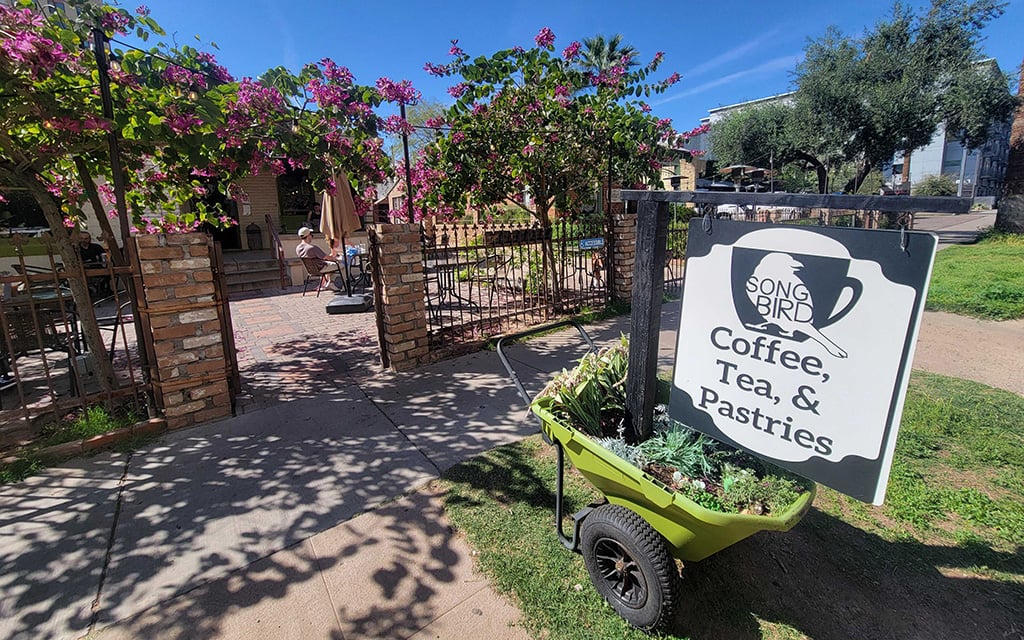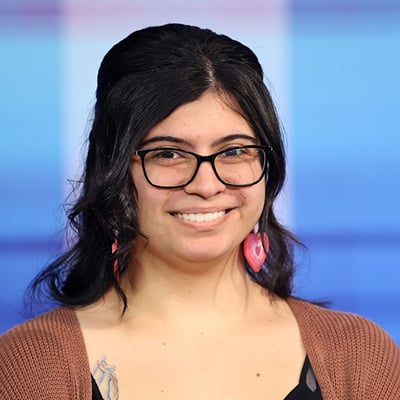
Songbird Coffee & Tea House is located in a historic house in downtown Phoenix and serves as a “third space.” (Photo by Analisa Valdez/Cronkite News)
PHOENIX – There’s something that occurs in a coffee shop when a series of individuals preparing for their day cross paths in a shared space. A man stops inside for a bite to eat, a woman keeps to herself and studies diligently in the corner, one barista wipes off tables while the other takes orders, and a young woman on the porch sketches in her notepad. While these people only interact partially with one another, what they’ve essentially created in this unassuming coffee shop is what is known as a “third space.”
In sociology, a third space is defined as a place outside of the traditional first spaces – like a person’s home or place of residency – and away from second spaces – like work or school – to create an environment where attendance doesn’t feel like a requirement or chore. However, during the COVID-19 pandemic, many of these spaces closed, keeping people in isolation even after the major lockdown protocols had expired. Much of the population sequestered themselves in their homes.
“Because of COVID-19, a lot of people went from maybe treading water to surviving, and third spaces, oftentimes or sometimes, can require money,” said Arizona State University professor Jamie Edmonds, who specializes in cultural anthropology. “I think that the world just looks like a very scary place. In some ways, it can be very overwhelming, and so I think that people don’t want to engage with others because it’s sometimes just scary.”
With COVID waning, people are returning to third spaces for varying purposes that range from productivity to relaxation to casual conversation. They have now been popularized in modern culture as places to study or hang out with friends: libraries, bars, lobbies, cafes, boba lounges, coffee shops.
“Me and my wife like to play putt-putt golf. Could be maybe me and my wife’s third space just because it’s fun and mindless and sometimes there’s a group ahead of you that’s really slow, sometimes they’re really fast, sometimes there’s kids screaming. It’s very third space-y,” Edmonds said. “Playing putt-putt golf doesn’t require you to have a particular stance. … It’s an opportunity to engage with others and feel connected to something bigger than yourself without having to have the same kind of fear and anxiety of engaging with others.”
An estimated 12.1% of U.S. adults have experienced social anxiety disorder at some point in their life, according to the National Comorbidity Survey Replication study conducted from 2001 to 2003. Social anxiety disorder is the persistent fear of being perceived negatively by others and anticipating humiliation and embarrassment in a social setting, and is more prevalent in the younger population.
“There are ways of creating communities, they don’t have to be scary and they don’t have to focus on how we’re different,” Edmonds said. “They can just accept that we are different, but that we still need each other. The way that we learn to need each other or have relationships with each other is by being in these third spaces and being present, and maybe not talking about whatever ails us or our side of some argument, but rather just living and existing in a space together.”
Songbird Coffee & Tea House is one of many businesses that has attempted to adapt nontraditional venues into third spaces that encourage engagement and attendance. Operating out of a historic house that was built in 1904, it acts as a homey haven surrounded by towering apartment buildings and office skyscrapers in the heart of downtown. Songbird has been a fixture in Phoenix since 2012, known for its wide selection of beverages and cozy, convenient study space.
“We’ve become very accustomed to isolation and we’re pretty much pros at it, but in the long term that’s very unsustainable because humans need that connection,” said Orlando Bellagio, a barista at Songbird. “I just want to make sure no one ever feels isolated. And that’s very, very prominent nowadays. When you have things like social anxiety … you meet people halfway.”
Jonathan Buford, the CEO at Arizona Wilderness Brewing and regular at Songbird, weighed in on the effects COVID-19 has had on third spaces, similar to his own businesses. “Affected it would be a way to put it. I think it devastated it. We haven’t quite recovered,” Buford said. “Cost of living goes incredibly high, so you don’t have that … ample room – especially downtown and the students – don’t have that area to entertain. This (Songbird) is it, for providing that place to go do your research paper or have a meeting. It’s part of the community, almost like sports, it’s all your backyard. And that’s kind of what I think we’re all providing down here.”
ASU 365 Community Union tries to serve the same third-space purpose as Songbird, but on a much larger scale. ASU 365 is an initiative that aims to utilize the Mountain America Stadium, where ASU plays football, as a year-round venue for students, faculty and staff to use regularly. Traditionally ASU’s stadium has only been used a handful of times a year for athletics and larger school events, but ASU 365 encourages the student body to take advantage of the vast multimillion-dollar stadium as a third space instead.
“A lot of the time that’s where my office is at. I’m at the stadium,” ASU 365 Director Henry Terrazas said. “I’m not set up like any normal director like in a cubicle or an office. I might be in a club space hanging out, I might just be out on the top of the stadium in the very top bleachers answering emails. It really is a nice space to break up the monotony of just being inside and being in your normal traditional spaces. It really is an awe-inspiring atmosphere when you walk into an empty stadium.”
Like Songbird and the stadium, third spaces that grant people the opportunity to either branch out of their comfort zone are becoming more prominent to the way our society functions – especially now, following a global pandemic that’s kept many people in isolation and unable to engage with others, or has even stunted their social development.
“If we don’t engage, if we can’t figure out how to engage with one another in a way that is respectful and in dialogue and supports the fact that we’re all human … then we kind of fall apart as a community and as a society,” Edmonds said. “So these third spaces and the desire to have relationships with others coupled with that is really important, and it’s how we move on. It’s giving people the benefit of the doubt and spending time in relation to one another.”
